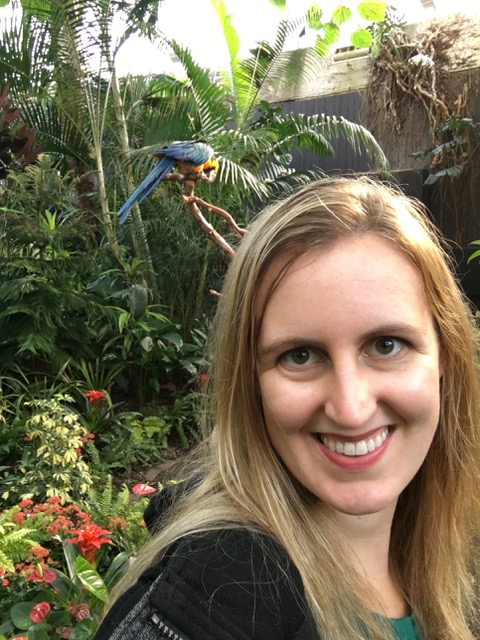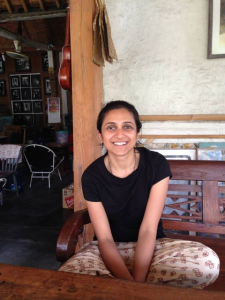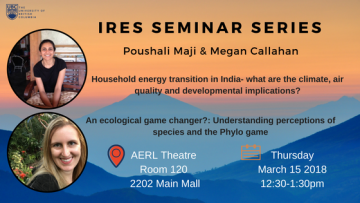IRES Seminar Series
Time: 12:30pm to 1:30pm (every Thursday)
Location: AERL Theatre (room 120), 2202 Main Mall
***************************************************************************
An ecological game changer?: Understanding perceptions of species and the Phylo game
Abstract:
Over millennia, the intertwined relationship between humans and non-human animals has shaped the subsequent survival and development of each group. As the world enters more fully into the Anthropocene, the future of both groups becomes more complex and investigating their interactions is more crucial. One area of inquiry revolves around humans’ perceptions of wildlife and identifying whether such perceptions may be altered. This study aims to explore one such potential tool for impacting perceptions and knowledge of species, the Phylo card game. The Phylo game is a competitive and interactive way for participants to engage with species and ecosystems. Utilizing an in-lab study design, this research identifies the impact of this novel educational approach and compares it to more traditional teaching methods across criteria including ecological perceptions, knowledge, positive and negative affect, and species recall.

Megan’s bio:
Meggie is a PhD candidate at IRES under the supervision of Dr. Terre Satterfield. Her research focuses on characterizing different aspects of the complex human-wildlife relationship and combines elements of anthropological inquiry, psychology-based perception work, and tenets of animal behavior and welfare. Meggie graduated from Pomona College with a BA in Environmental Analysis. She then completed her MA at IRES, utilizing a species-based evaluation to explore the effectiveness of zoo-based conservation projects. She credits her previous work at a wildlife rehabilitation center with helping to solidify her interest in animal-human interactions.
Household energy transition in India – what are the climate, air quality and developmental implications?
Abstract:
Clean cooking fuel and household electrification provide a number of benefits – improvement in indoor air quality, rise in productive evening activities and time saved in collecting fuelwood being a few. However, modern energy services in India – liquefied petroleum gas (LPG) and electricity – are currently fossil fuel based and have implications for greenhouse gas emissions. In India, over the last few decades, households have been transitioning from fuelwood and dung to LPG for cooking and from kerosene to electricity for lighting. The uptake of modern energy services has occurred at different rates in urban and rural India, and in different income groups. In this study I use evidence from the 2 nation-wide surveys to quantify the impacts of household energy transition on air quality, climate and development for different population groups.

Poushali’s Bio:
Poushali is a PhD candidate at the Institute for Resources, Environment & Sustainability, working with Dr. Milind Kandlikar. She works at the intersection of 3 major energy challenges facing large developing countries – clean energy access & development, air quality improvement and climate change mitigation. Her research focuses on using large scale datasets to analyse patterns of historical energy consumption as well as building models of energy systems. She has an undergraduate degree in Physics from the University of Delhi, and a Master’s in Renewable Energy from the University of Edinburgh. In the past, she worked with WWF’s Climate Change & Energy programme and as a wind energy consultant.
